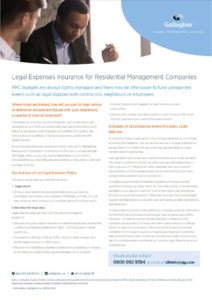
Landlord legal expenses insurance
Legal disputes are a real risk if you’re a landlord or work in residential management. Without legal expenses insurance, you could be left to cover potentially substantial legal fees.
What is legal expenses insurance?
Often referred to as landlord legal protection, landlord legal expenses insurance can financially support landlords in legal disputes. For example, it can help cover the costs of court fees and lawyers, which often cost thousands. You can also access legal advice with legal expenses insurance to help resolve issues quickly and effectively.
Why legal expense cover is a sensible consideration
You never know when a legal dispute might crop up. If it does, you could face substantial legal fees without legal expenses insurance. Not to mention the stress and panic this type of situation can cause when you don’t have adequate protection.
Legal expenses insurance can help alleviate those worries. It can cover the costs of legal proceedings and give you access to specialist on Landlord related matters. Whether it’s guidance on handling a tricky tenant situation or during a property damage dispute, this cover helps to ensure you have the support when you need it.
Key features of our landlord legal expenses policy
Landlord legal expenses insurance can provide the following benefits:
- Legal advice: Access specialist legal guidance to help resolve issues quickly and effectively.
- Insurance for legal costs: Cover various legal expenses, including court fees and legal representation.
- Employment rights disputes: Protect yourself against claims made by employees, including wrongful dismissal or discrimination.
- Contract and regulatory body disputes: Get assistance with contract disputes and challenges from regulatory bodies.
- Tax disputes: Cover the costs associated with tax investigations and disputes with HMRC.
- Repossession cover: Cover the legal costs of repossession if a tenant fails to leave the property.
- Property damage: Get legal support for property damage caused by tenants.
These are brief product descriptions only. Please refer to the policy documentation paying particular attention to the terms and conditions, exclusions, warranties, subjectivities, excesses and any endorsements.
When this policy could help you
Legal expenses insurance can help protect the following legal issues:
- Disputes over unpaid rent: Cover the costs of pursuing unpaid rent through legal channels, including eviction proceedings if necessary.
- Property damage claims: Cover legal fees for recovering the costs of repairs if a tenant causes significant damage and refuses to pay.
- Eviction of problem tenants: Cover the costs of legal action needed to evict tenants who refuse to leave after the tenancy agreement ends or is breached.
- Contract disputes with suppliers: Cover legal costs to resolve disagreements with contractors or suppliers over services provided for your rental property.
- Employment-related issues: Cover legal expenses related to employee disputes, such as contract disagreements or unfair dismissal claims.
- Health and safety claims: Cover the legal costs of defending against claims made by tenants or third parties over health and safety violations.
For a copy of our guide to legal expenses insurance, the cover the policy* provides and examples of how the cover could benefit you, click here.
* For full terms and conditions please refer to the policy wording available on request. A broad range of protection is provided to you, including advice at a time that is convenient to you and insurance against legal costs to pursue cases where necessary. As with all insurance policies, the policy is subject to limits, conditions and exclusions. For more information please contact us to discuss further, or request a full summary of the cover or the full policy terms and conditions. For this type of insurance it is particularly important to note that legal advice and the insurer’s consent to costs must be sought as soon as you identify a possible problem and before you incur any costs, failure to do so will invalidate a claim.
Landlord legal expenses insurance FAQs
Please note that these Frequently Asked Questions are not a substitute for the policy wording. For full terms and conditions please see the policy documentation.
Below are some common questions about landlord legal expenses insurance. If your query isn’t answered, get in touch. We’ll be happy to provide guidance.
Do I need legal expenses cover as a landlord?
It’s not a legal requirement to have legal expenses cover, but it’s a sensible consideration. After all, you never know when a legal dispute may crop up. If one does, such as a dispute with a tenant over unpaid rent or a disagreement about property damage, you could be left to cover potentially huge legal fees if you don’t have landlord legal expenses insurance.
Does home insurance cover legal costs?
Some home insurance policies may offer a basic level of legal cover, but this is often quite limited. That’s because home insurance legal cover is typically designed for personal use, such as disputes over property boundaries or personal injury claims, rather than landlord-specific issues. Landlord legal expenses insurance can provide specialist protection. It can cover the types of disputes landlords commonly face, such as tenant issues, eviction disputes, and contract disagreements.
Are legal and professional fees tax deductible?
Yes, certain legal and professional fees involved with managing your rental property can be tax deductible. For example, suppose you need legal advice to draw up a tenancy agreement or pay professional fees related to a property dispute. When you file your tax return, these costs may be deductible against your rental income.
However, not all legal fees are tax deductible—personal legal costs or fees related to acquiring the property usually don’t qualify. To ensure you’re claiming correctly and maximising your deductions, it’s always best to consult a tax professional who can guide you through what is and isn’t allowable.
What does landlord legal expenses insurance not include?
Most policies won’t cover rent loss* or the costs of legal action if you, as the landlord, are at fault. For example, if you breach the terms of the tenancy agreement or fail to meet your legal obligations, such as carrying out essential repairs, the insurance won’t cover you.
Plus, any disputes or incidents before the policy started are generally excluded, so taking out cover early is important to avoid gaps. Make sure to carefully review the terms and conditions of your policy so you fully understand what is and isn’t covered.
Can I purchase landlord legal expenses insurance for an unoccupied property?
Yes, getting landlord legal expenses insurance for an unoccupied property is possible. Landlords can face legal issues even when a property is empty, such as disputes with contractors carrying out repairs or squatter-related problems. Insurance for unoccupied properties helps to ensure you’re protected against legal disputes while the property is vacant. Remember that some insurers may have specific terms for unoccupied properties, so it’s worth checking whether this type of cover has additional conditions or limitations.
What could invalidate my legal expenses cover?
There are several reasons why your landlord’s legal expenses insurance could become invalid, and it’s important to be aware of these to avoid issues when you need to make a claim. One of the most common reasons is providing incorrect or incomplete information when you apply for the policy. This could include failing to disclose important details about the property or your tenants or misrepresenting your circumstances.
Failing to keep up with ongoing requirements, such as having up-to-date tenancy agreements or providing accurate information about disputes when they arise, could also affect your cover. It’s crucial to read the policy terms carefully and provide all necessary information accurately to avoid any issues later.
*The Gallagher Landlords Legal Expenses policy offers the option to insure for unpaid rent owed by a tenant where the insurer has accepted a claim for repossession of the residential property. This cover is a chargeable option and subject to the Insured being responsible for the first unpaid month’s rent
(which you have collected as a deposit)
